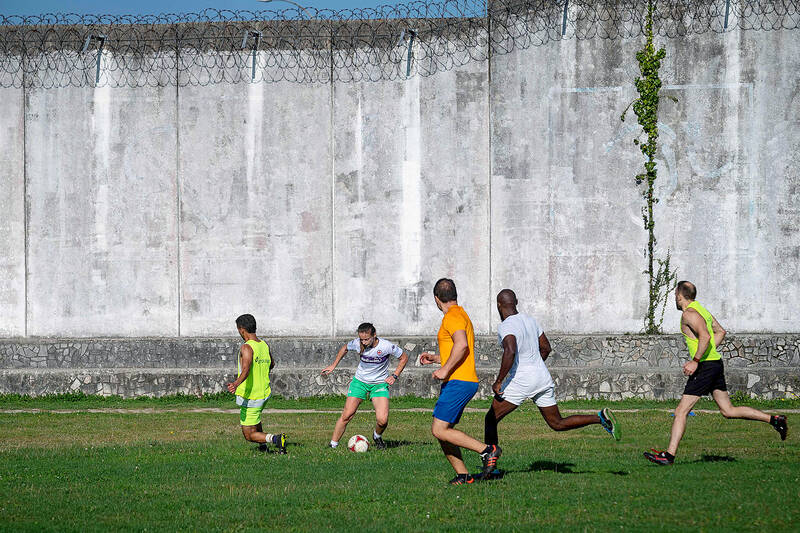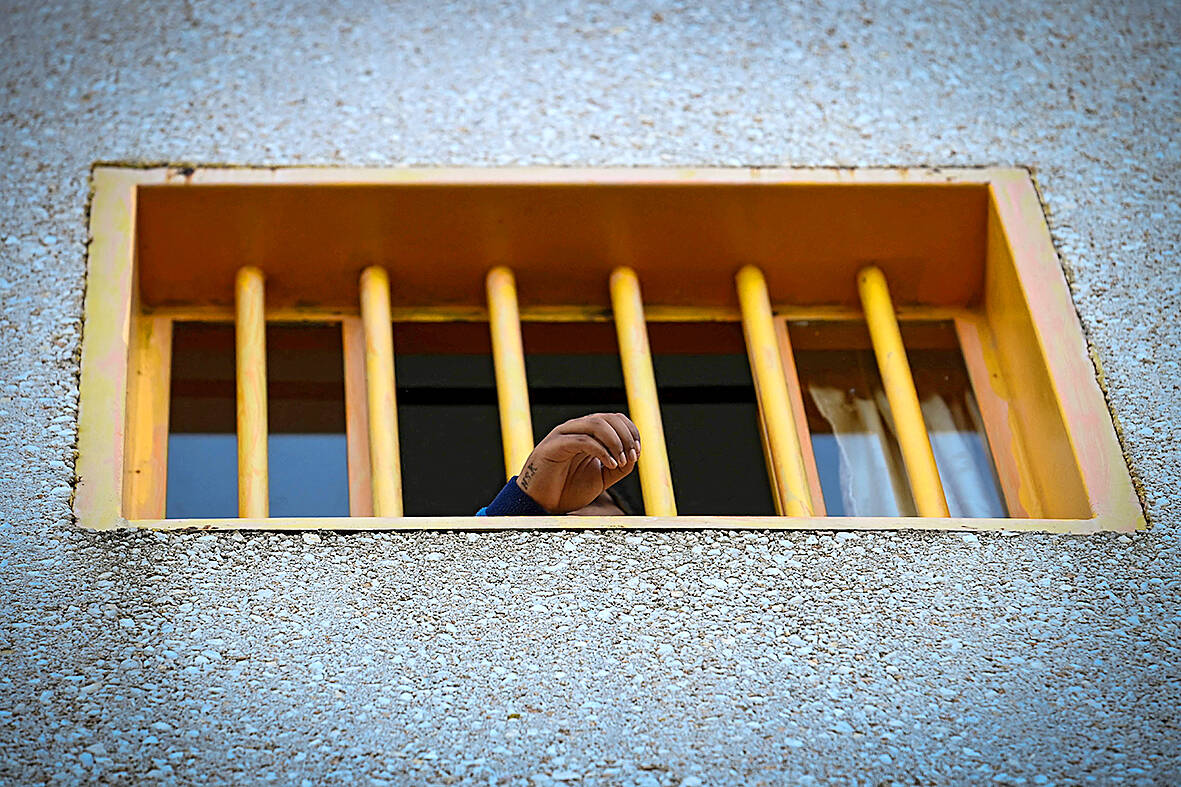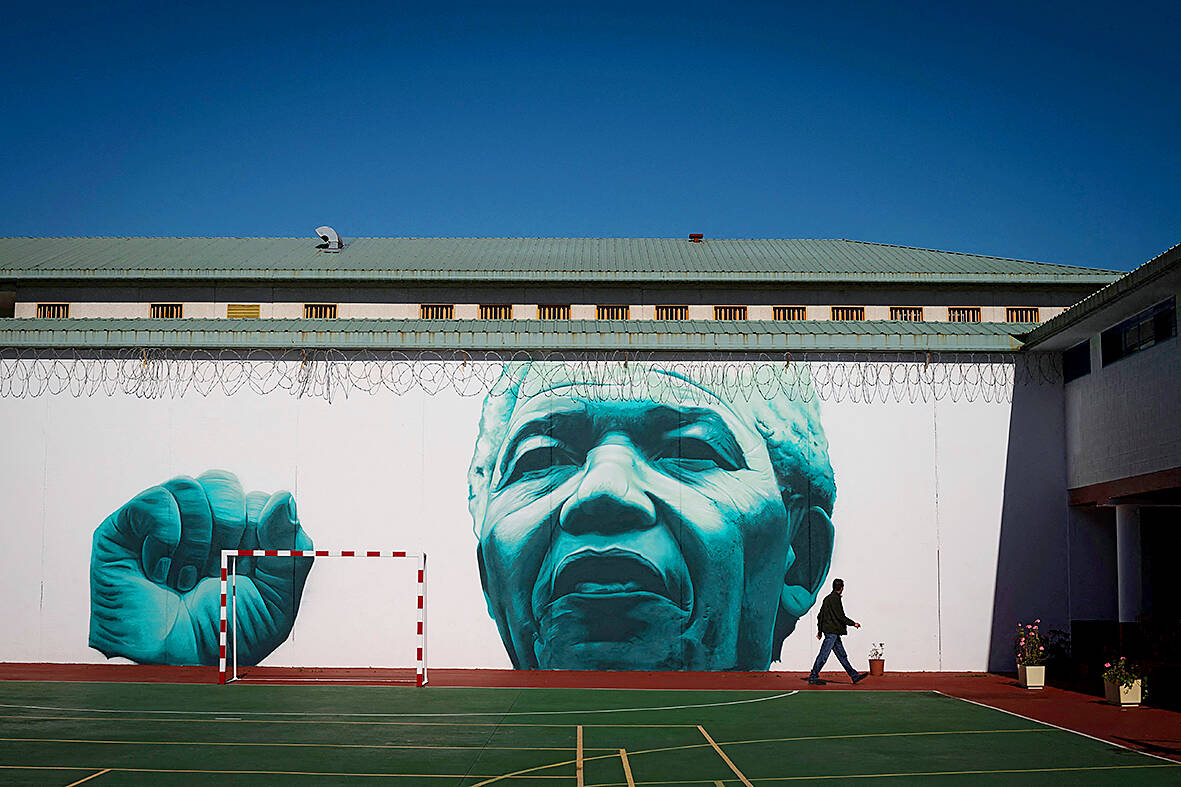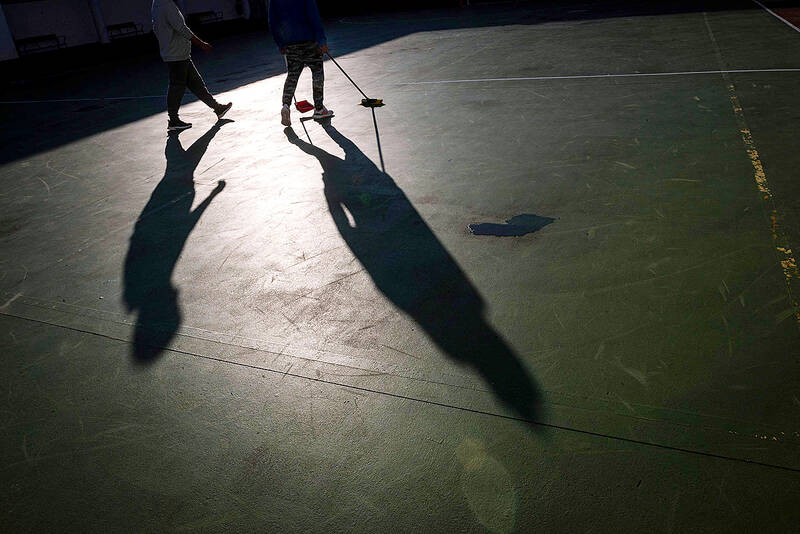At a jail in northwestern Spain, a sole female inmate played football with 21 male convicts, part of a push towards mixed prison living that remains rare in Europe.
“Let go of the ball!” Ambra, a 25-year-old Albanian who did not want to give her surname, shouted at one of her male teammates.
She pushed them as much as she was pushed to try to gain control of the ball.

Photo: AFP
“Why should prison be the only place without mixed spaces?” she wanted to know.
Men and women have been cohabiting since 2021 in one wing of the Teixeiro prison near La Coruna in Spain’s verdant Galicia region. The aim is to better prepare inmates for their reintegration into society once they are released.
Twenty of the 55 inmates in the jail’s Nelson Mandela cell block are women.

Photo: AFP
They and the men take part together in daily activities such as exercise, group therapy and vocational training.
They work and eat together.
The rest of the time, they live in separate cells although in the same hallway.

Photo: AFP
Inmates must volunteer to be part of this block and are selected based on their behavior. Prisoners convicted of sexual violence are excluded.
At the canteen, inmate Cristina prepared meals with other women and men, while at the gym Helga worked out with her male counterparts.
‘PREPARE FOR LIFE’

Photo: AFP
Considered a reference in Europe when it comes to women rights, Spain has for over two decades experimented with coed prisons.
There are currently 20 mixed-gender cell blocks in Spain, where 202 women and 925 men take part in joint activities. That is just a fraction of Spain’s total jail population of around 47,000.
But the government of Socialist Prime Minister Pedro Sanchez has encouraged the country’s prison system to further develop these mixed-gender cell blocks.
“It makes no sense for you to prepare for life outside jail with only half of the population,” said the deputy director of the Teixeiro prison, Nadia Arias.
She said coed jail blocks helped prisoners get used to being in a society where men and women co-exist.
The initiative also allows women prisoners, who are far fewer in number, to access the services and programs available to men, Arias said.
Ricardo, a repeat offender who has spent time in solitary confinement, said he hesitated when prison administrators suggested he moved to the mixed-gender cell block because he had “spent a lot of time with men.”
Now he says he prefers it since there are fewer tensions.
In an all-male prison block respect is earned by defending your belongings, and a “dirty look could lead to a knife fight or a fist fight”, the 47-year-old said.
‘GOOD IDEA’
Ambra, the 25-year-old Albanian, said men in the mixed-gender block sometimes misinterpret her friendliness and think she “wants to hook up, or something like that.”
“So I put up a barrier,” she explained.
Ana Suarez, a counsellor at Erguete, a non-governmental organization that helps people battling addictions and works with inmates in the jail, said “sexist behaviors happen inside prison just like outside.” The prison offers workshops to inmates on “deconstructing masculinity.”
The prison’s management said it has not experienced “any serious incidents” in the mixed block, which was in “great demand” from inmates wishing to join it.
Elsewhere in Europe, mixed jail blocks are not common.
In neighboring France, for example, where coed incarceration has been authorized since 2009, there are no jails where men and women are kept in the same area as in Teixeiro.
Men and women in French jails mix only during scheduled activities.
“I think it’s a very good idea to have men and women cohabiting because that’s how life is outside,” said Ambra.

Nine Taiwanese nervously stand on an observation platform at Tokyo’s Haneda International Airport. It’s 9:20am on March 27, 1968, and they are awaiting the arrival of Liu Wen-ching (柳文卿), who is about to be deported back to Taiwan where he faces possible execution for his independence activities. As he is removed from a minibus, a tenth activist, Dai Tian-chao (戴天昭), jumps out of his hiding place and attacks the immigration officials — the nine other activists in tow — while urging Liu to make a run for it. But he’s pinned to the ground. Amid the commotion, Liu tries to

A dozen excited 10-year-olds are bouncing in their chairs. The small classroom’s walls are lined with racks of wetsuits and water equipment, and decorated with posters of turtles. But the students’ eyes are trained on their teacher, Tseng Ching-ming, describing the currents and sea conditions at nearby Banana Bay, where they’ll soon be going. “Today you have one mission: to take off your equipment and float in the water,” he says. Some of the kids grin, nervously. They don’t know it, but the students from Kenting-Eluan elementary school on Taiwan’s southernmost point, are rare among their peers and predecessors. Despite most of

A pig’s head sits atop a shelf, tufts of blonde hair sprouting from its taut scalp. Opposite, its chalky, wrinkled heart glows red in a bubbling vat of liquid, locks of thick dark hair and teeth scattered below. A giant screen shows the pig draped in a hospital gown. Is it dead? A surgeon inserts human teeth implants, then hair implants — beautifying the horrifyingly human-like animal. Chang Chen-shen (張辰申) calls Incarnation Project: Deviation Lovers “a satirical self-criticism, a critique on the fact that throughout our lives we’ve been instilled with ideas and things that don’t belong to us.” Chang

The resignation of Taiwan People’s Party (TPP) co-founder Ko Wen-je (柯文哲) as party chair on Jan. 1 has led to an interesting battle between two leading party figures, Huang Kuo-chang (黃國昌) and Tsai Pi-ru (蔡壁如). For years the party has been a one-man show, but with Ko being held incommunicado while on trial for corruption, the new chair’s leadership could be make or break for the young party. Not only are the two very different in style, their backgrounds are very different. Tsai is a co-founder of the TPP and has been with Ko from the very beginning. Huang has